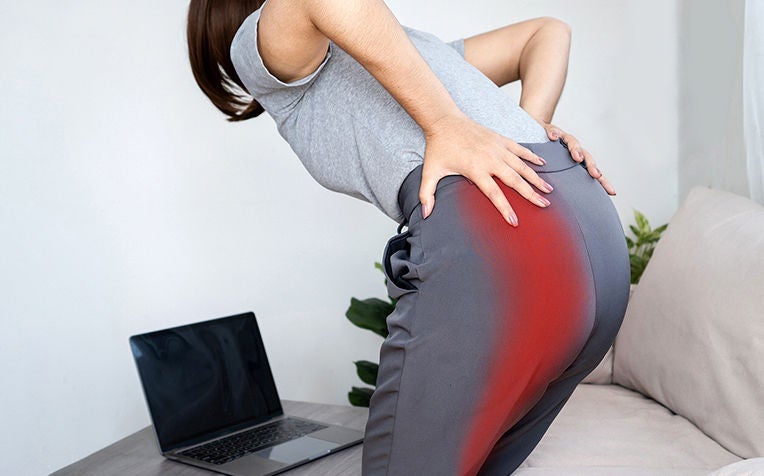
Sciatica is a nerve pain that starts from the lower back and radiates down the leg. It is often caused by a pinching of the sciatic nerve, the longest and thickest nerve in the body.
About 80 per cent of the adult population will experience lower back pain at some point in their lives.
However, if you persistently experience back pain radiating to your hips, buttocks, back of your legs and even to your feet, you may have sciatica.
Sciatic pain is often accompanied by numbness, weakness and tingling sensations in the legs, particularly on one side of the body. This is the result of the sciatic nerve being compressed by a herniated disc or slipped disc, bone spur or very rarely, a tumour.
“Most people will recover from short-term or acute sciatica with some bed rest, pain relief medications and gentle, stretching exercises.
Those with chronic sciatica will typically need a combination of pain relief medications, physiotherapy and exercise,” explains the Department of Neurosurgery at National Neuroscience Institute (NNI), a member of the SingHealth group.
What is the sciatic nerve?
The sciatic nerve is the longest nerve in the body. It runs from the back of the pelvis to the buttocks and all the way down both legs to the feet. You may experience mild to extreme lower back pain and pain in the buttocks and legs when any part of the sciatic nerve is compressed or irritated.
What causes sciatica?
Common causes for sciatica are:
-
Herniated disc in the lumbar spine (lower back)
When the protective cushion (disc) between the lumbar vertebrae ruptures due to disc degeneration or spinal injury, it may press on the sciatic nerve and cause nerve irritation and inflammation. This can lead to pain and numbness in the buttocks and back of the legs.
-
Bone spurs
When bony growths on the lumbar vertebrae compress any part of the sciatic nerve, they can cause pain, numbness and tingling sensations in the lower part of the body.
Symptoms of sciatica
Coughing or sneezing usually makes sciatic pain worse. Sciatica is recognisable based on the nature and location of the pain:
- Radiating pain from the buttocks to the leg (usually on one side of the body)
- Tingling sensations down the leg
- Leg numbness and muscle weakness that impede walking
- Sudden shooting pain that makes standing up difficult
When to see a doctor
Seek immediate care if your back pain is associated with new bowel or bladder symptoms (i.e. difficulty going or inability to control urine or bowel motion) or if the back pain follows a fall or trauma.
Also, consult a doctor if you experience:
- Unexplained weight loss
- Persistent pain from an injury
- Fever or night sweat
- Pain which does not improve after rest or pain medication
- Swelling, redness or severe pain affecting multiple joints
- Any loss of function (e.g. Unsteady walking, weakness, worsening balance)
How is sciatica diagnosed?
Doctors will check your muscle strength and reflexes to see if your lower back pain, leg numbness and weakness could be caused by sciatica.
The diagnosis will be confirmed by an X-ray and MRI scan which will show if the pain is due to bone spurs, herniated discs or other causes.
Relief for sciatica pain
Mild cases of lower back pain can be prevented and managed through lifestyle modifications:
- Use over-the-counter pain relievers, plasters, heat, or cold packs to temporarily relieve the pain
- Avoid staying in the same position for long periods of time
- Maintain a healthy weight
- Lift properly and avoid bending at the waist
- Change your workspace to reduce strain on the back
- Stretch and exercise regularly to strengthen and increase the flexibility of back muscles. e.g. swimming, brisk walking, cycling
- Sleep on a firm mattress
Treatment of sciatica
Sciatic pain usually resolves within a few days or few weeks with self-help measures such as bed rest, over-the-counter painkillers as well as hot or cold packs.
However, seek immediate medical attention if there is a loss of feeling in the affected legs, loss of bowel or bladder control and if the pain becomes progressively worse in spite of bed rest and painkillers.
Medications
Non-steroidal anti-inflammatory drugs (NSAIDs) such as ibuprofen and naproxen, as well as muscle relaxants, can be prescribed to relieve sciatica pain. This is followed by physical therapy which includes spine and lower back stretching and strengthening exercises.
Spinal surgery
Spinal surgery is only recommended when non-invasive treatments fail or when sciatica causes loss of bowel and bladder control, severe leg weakness and numbness. If the pain makes it difficult to move, stand or carry out day to day activities, surgery can be considered. Improvements in spinal surgery have improved surgical outcomes, and have reduced the risks of surgery.
Surgery involves removing either the bone spur, part of the herniated disc or widening the spinal canal and can be performed using minimally invasive or keyhole surgery.
To prevent sciatic pain from recurring, maintain a healthy body weight, avoid prolonged sitting, keep a good posture and make stretching a daily routine.
Ref: R14
Related articles:
Ankylosing Spondylitis (Spine Inflammation): Causes, Symptoms, Treatment
Contributed by

















 Get it on Google Play
Get it on Google Play